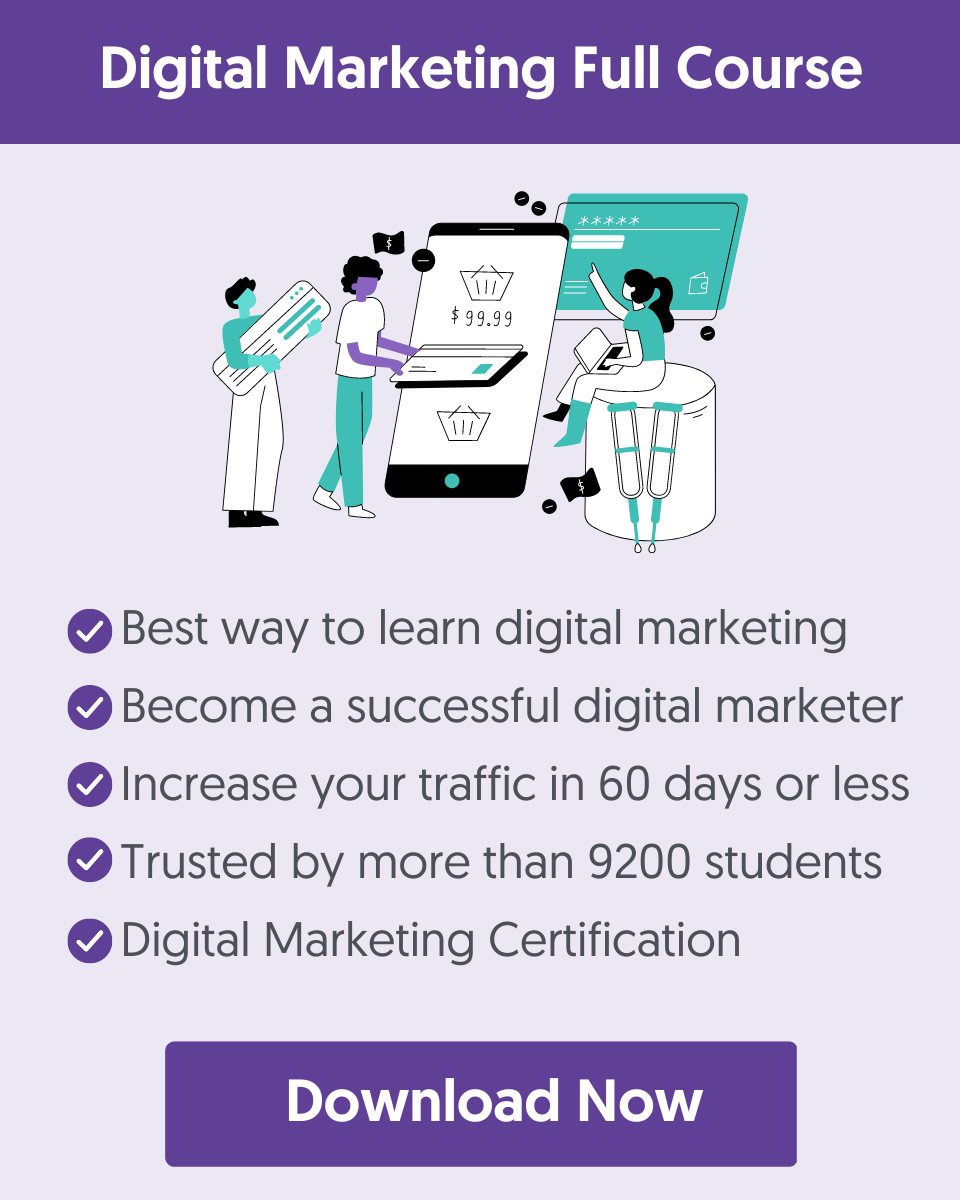What Is AI In Digital Marketing?
AI in digital marketing refers to using artificial intelligence technologies to automate tasks, analyze data, and optimize marketing campaigns. It helps marketers create content that resonates with their audience and make data-driven decisions to improve campaign performance.
A great example of AI technologies used in marketing is generative AI tools like ChatGPT, Gemini, and Microsoft Co-pilot. Marketers can use these tools to get ideas for new content or perform deep data analysis tasks without writing custom code.
Another example is AI-automated chatbots used for customer service and help desks.
Why Use AI in Digital Marketing?
The way AI tools dominate the industry, you have no choice but to start using AI tools in your campaigns and processes. While many marketers perceive AI as a threat, in reality, it’s an opportunity to do things better, faster, and more cost-efficient.
Let’s see some of the most notable advantages of using AI in digital marketing.
Speed: How long does it take you to prepare an article outline now with the help of ChatGPT and by doing manual research? It’s a simple example, but it shows how AI can help you speed up some tasks and utilize your time better.
Idea creation: Many digital marketing tasks involve creating different types of content, such as articles, social media posts, Ad copies, or emails. AI tools can give you ideas and spark your creativity.
Offer personalized experiences to customers: The ability of AI technologies to process large amounts of data fast opens the path for offering personalized experiences to customers. A great example is Netflix’s content suggestion tool, which analyses your viewing preferences to find and suggest content you like.
Another example is Sephora’s virtual assistant, which allows one to scan an image and view a list of matching lipsticks.
Let’s see some practical ways to use AI today and get help with various digital marketing tasks.
7 Ways To Use AI In Digital Marketing (Examples)
- AI For SEO
- AI For Content Marketing
- AI For Social Media Marketing
- AI For PPC Marketing
- AI For Email Marketing
- AI For Ecommerce Marketing
- AI For Video Marketing
1. AI For SEO
There are two ways to use AI for search engine optimization purposes. The first is to take advantage of AI features offered by the various marketing tools, and the second is to use well-engineer prompts to get ChatGPT (or other tools) to perform SEO-related tasks.
Semrush, for example, recently added a CoPilot AI feature that analyses your SEO data and makes recommendations on new keyword opportunities, broken links, backlinks, technical SEO issues, and many more.
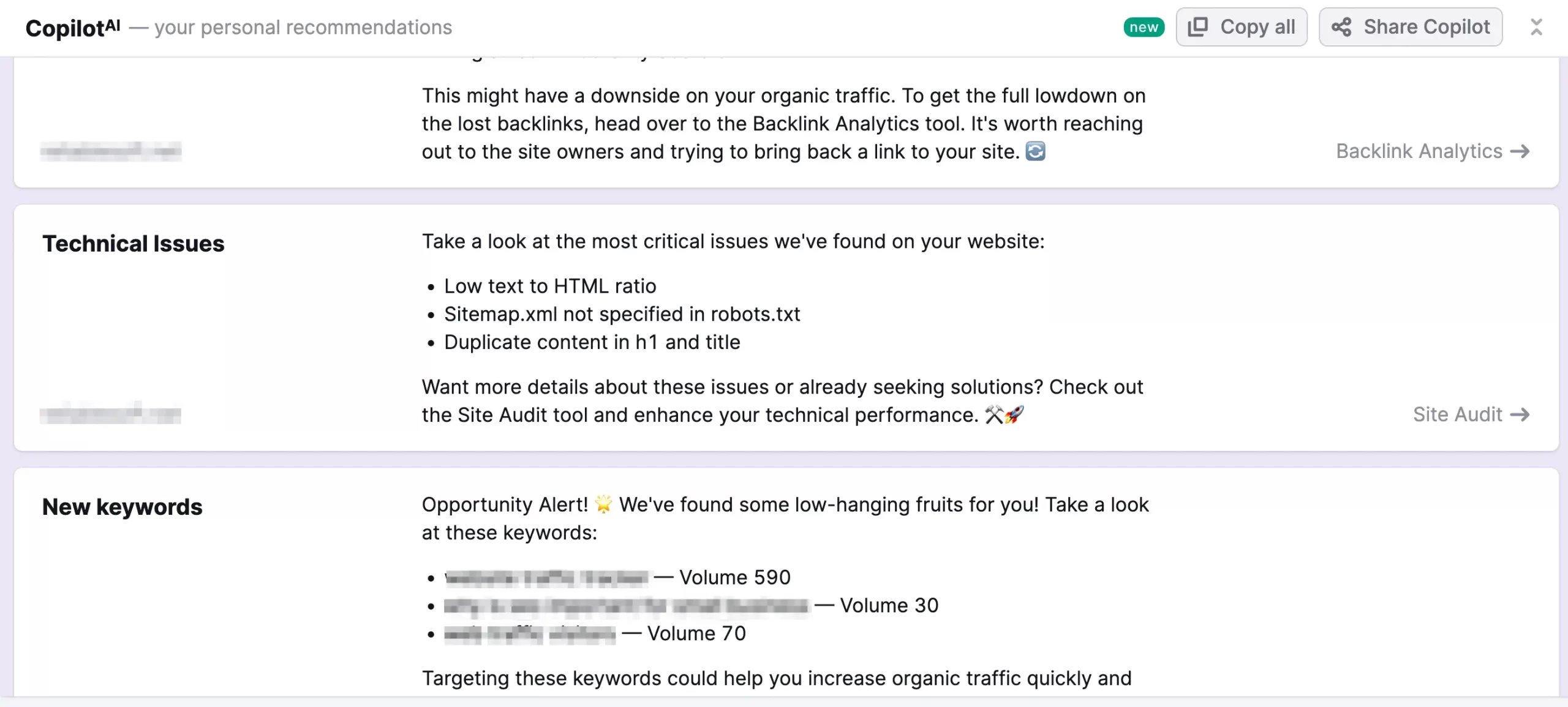
Mailchimp has added a feature to help with writing email subject lines and content; Microsoft Clarity can give you recommendations on reducing your website’s bounce rate based on user-recorded sessions. These are just a few examples. I’m sure if you check with your favorite tools, you’ll find new features powered by AI.
The second, more actionable way to use AI for SEO is to use tools like ChatGPT or our own AI Text Generator tools to get help with SEO tasks like keyword research, optimizing SEO titles and meta descriptions, generating schema markup code, optimizing parts of your content for Google featured snippets, and more.
Let’s see a couple of examples of how to do this.
To get ideas for a meta description for a post, go to our free meta description generator and enter the prompt “Create an engaging meta description of around 160 characters for a post titled “How To Use AI in Digital Marketing”. The post is aimed at marketers looking for ways to use AI in their marketing.”.
You’ll instantly get a suggestion, clicking the “More Like This” button will generate more ideas.
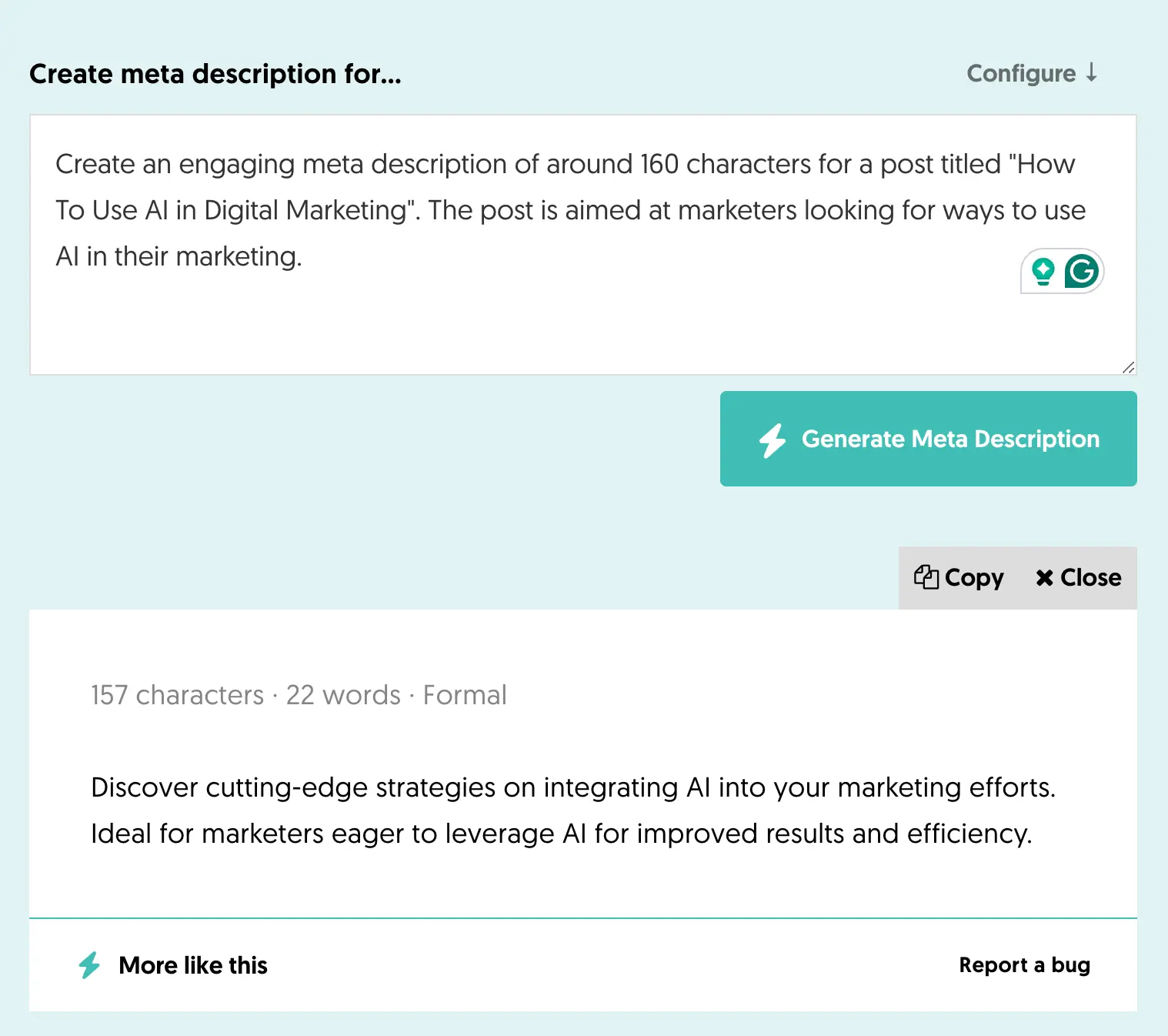
Like the above, you can get AI to perform several SEO tasks. What is important is to use the right prompts. Our AI Digital Marketing Course includes many examples and guidelines on creating prompts to get meaningful results from AI tools. The most important are:
- Talk to AI like you would talk to a human.
- Tell AI what role to play.
- Provide as many details as possible.
- Ask follow-up questions and provide feedback.
Here is another example of a well-crafted prompt for SEO related to keyword research.
What are specific questions or topics people ask about nutrition for athletes? create a list.
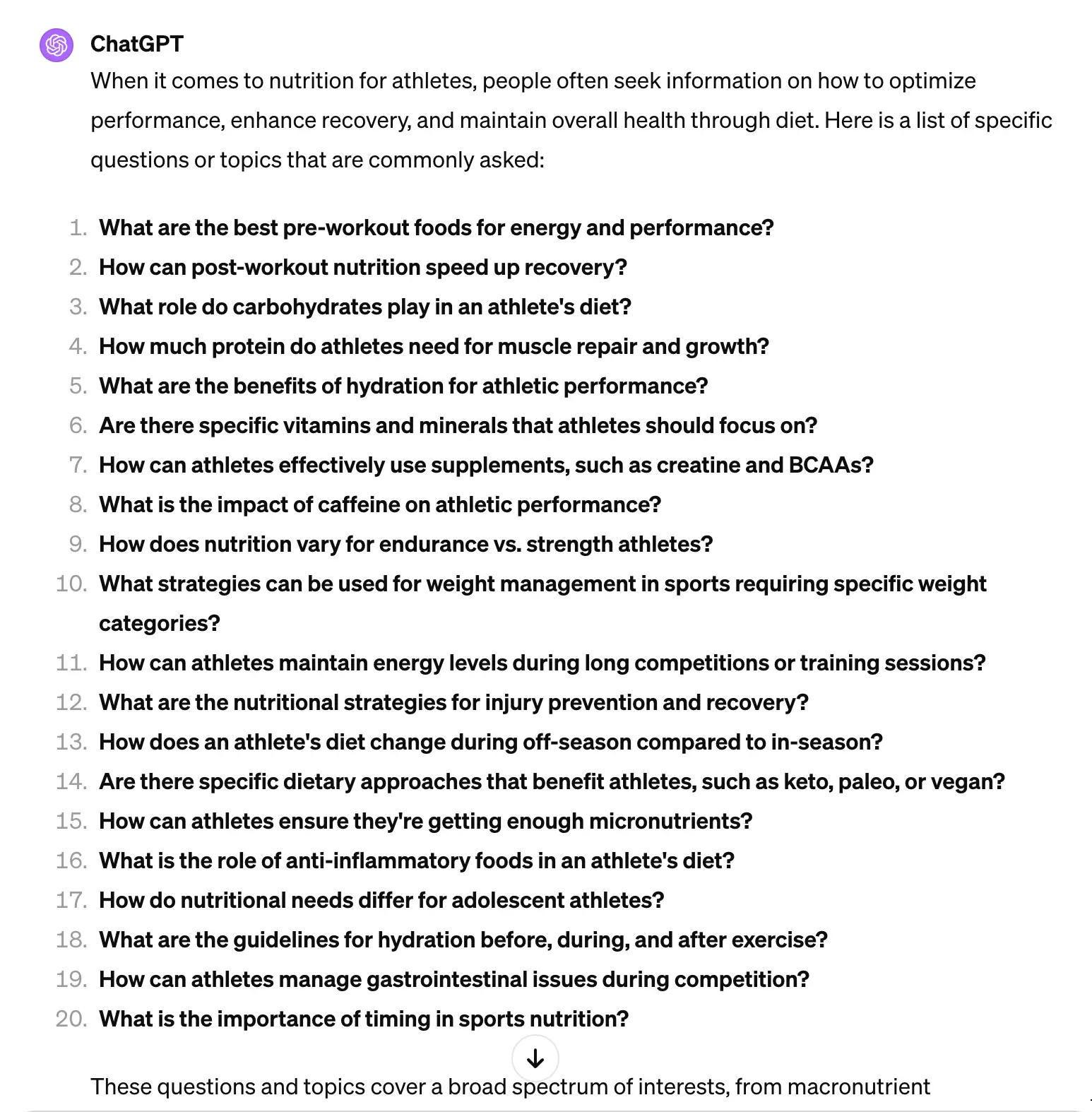
2. AI For Content Marketing
AI can assist in content creation, but not how you think. It is very tempting to ask AI to write complete articles for you, but this is against Google guidelines and will likely get you into trouble.
Instead, you can use AI to accelerate the content creation process. For example, you can use it to get ideas for new blog posts, assist in crafting article outlines, and help when you’re faced with writer’s block.
Here are a couple of use cases together with the right prompts.
Blog Post Ideas
Generate 5 innovative blog post ideas for a nutrition blog focusing on vegetarians. The goal is to engage people seeking more protein using vegetarian food.
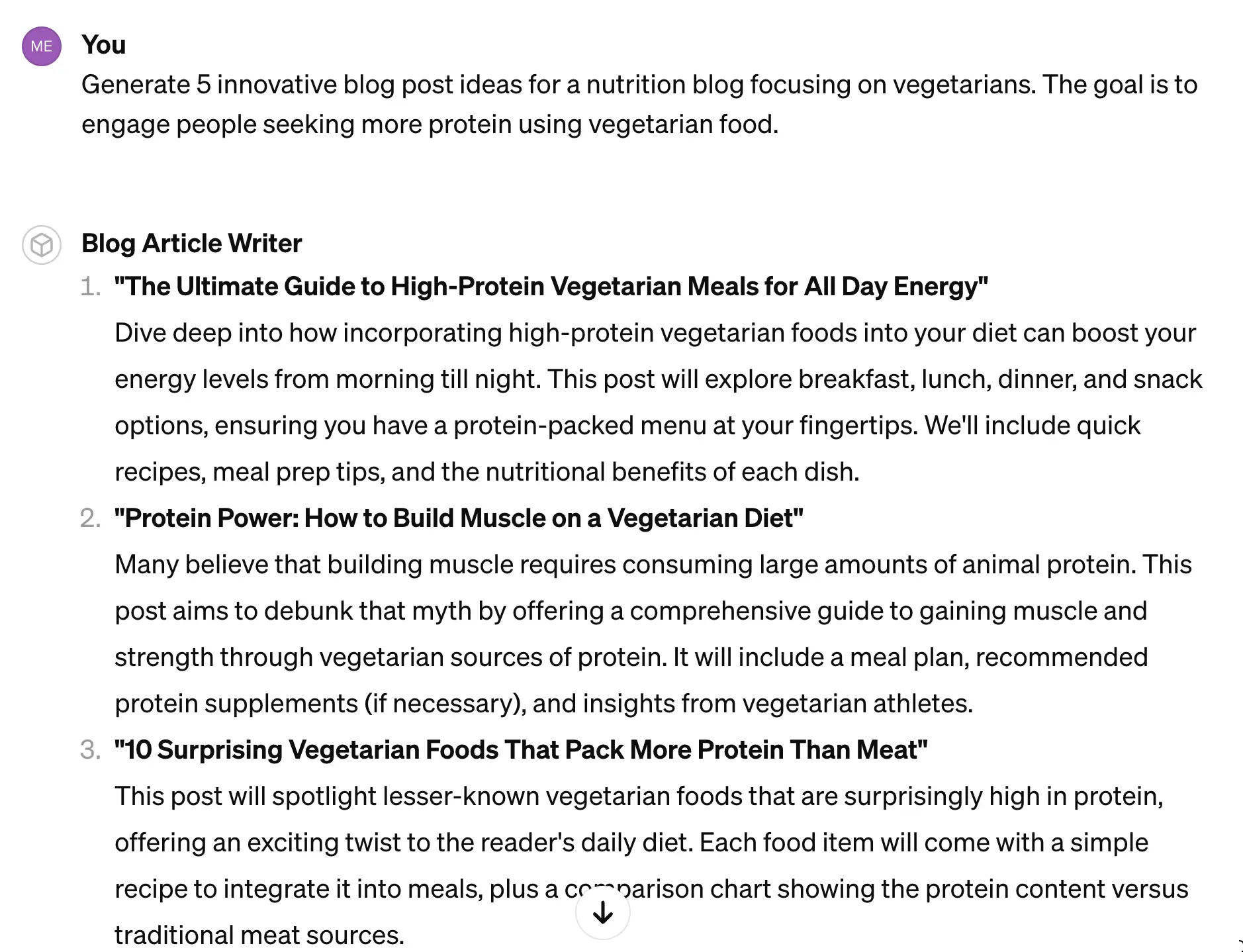
Article Outline
You are an experienced nutritionist. Create a detailed outline for a 1500-word blog post titled “Protein Power: How to Build Muscle on a Vegetarian Diet”. The post should cover the importance of protein in every diet and include examples of how men and women can meet their daily protein needs without supplements. Aim for a conversational tone that simplifies complex concepts for beginners. Use simple language that can be understood by non-English speakers.
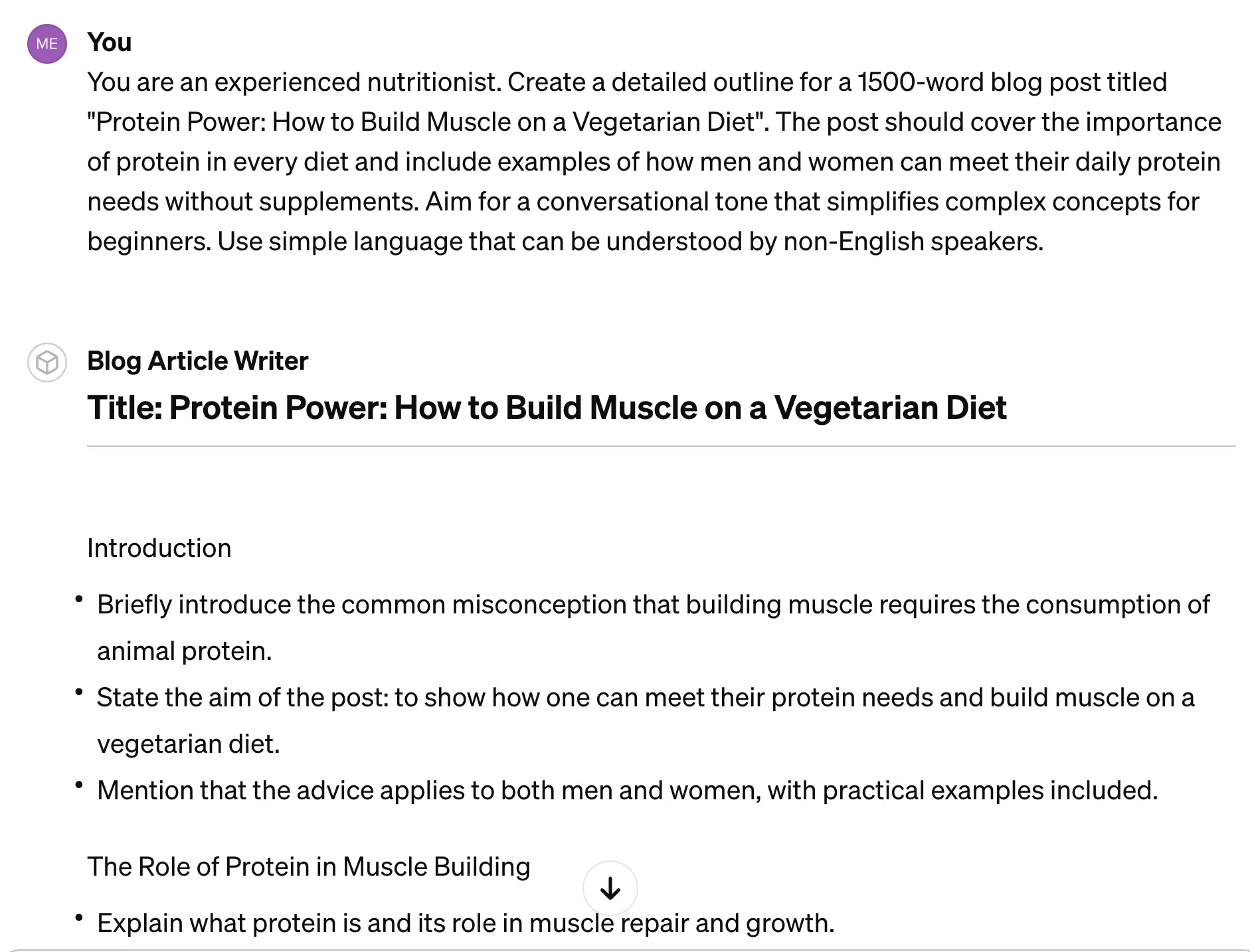
According to a recent study, companies use AI in content marketing to create short videos, images, creative writing, case studies, and white papers. The image below shows the most popular uses.
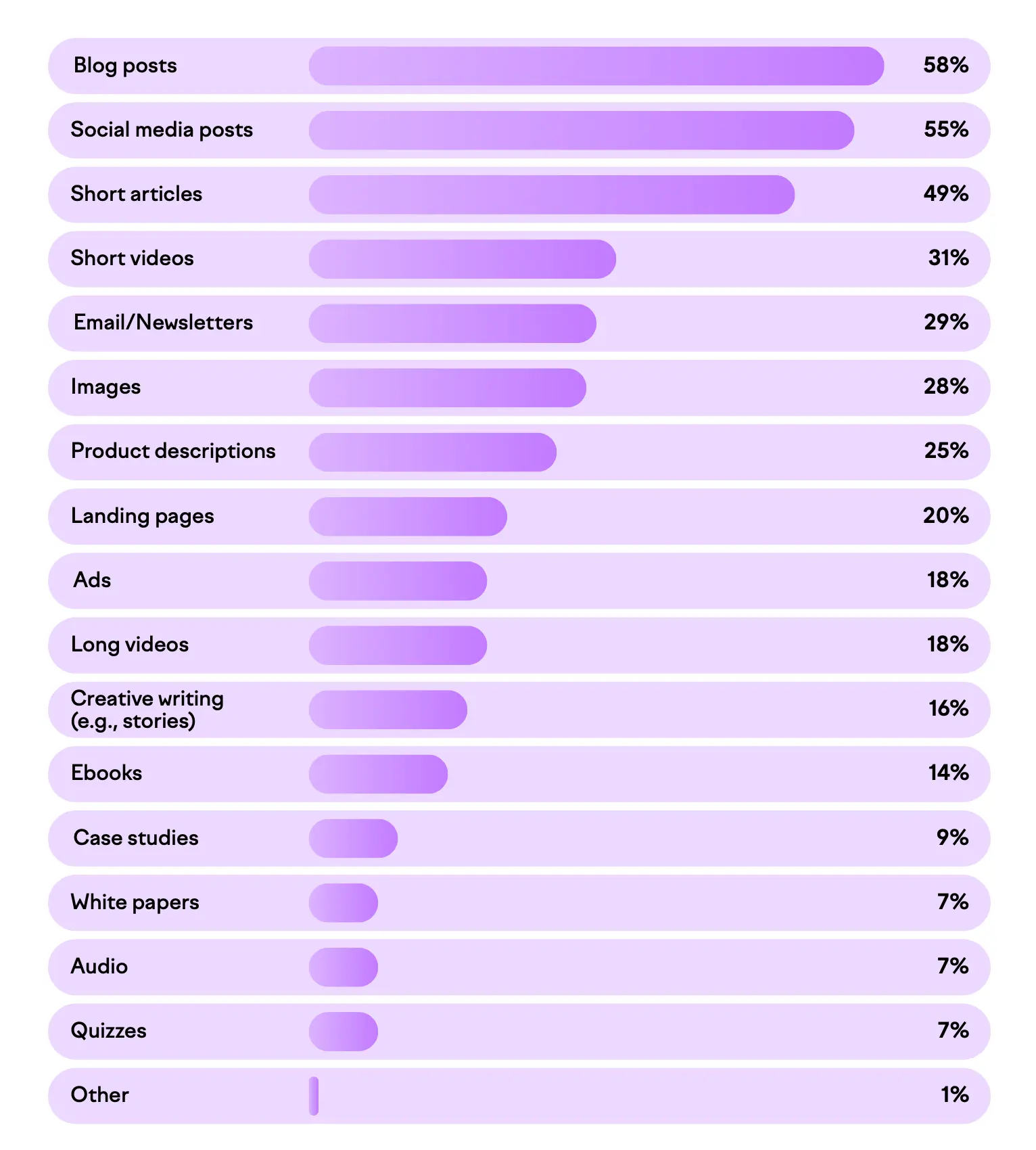
3. AI For Social Media Marketing
AI can be a great tool for social media marketing campaigns because of its creativity. AI doesn’t have emotions or the experience of humans, but it can utilize its vast amount of data to come up with creative ideas for social media campaigns.
Go to ChatGPT and type the following prompt: “Generate a catchy Instagram post promoting a coffee shop’s new seasonal iced latte. Use a playful tone that encourages followers to tag a friend they’d like to share a latte with. Include hashtags focused on summer and coffee trends.”
The result may need some adjustments, but overall, it is a good starting point for your campaign.
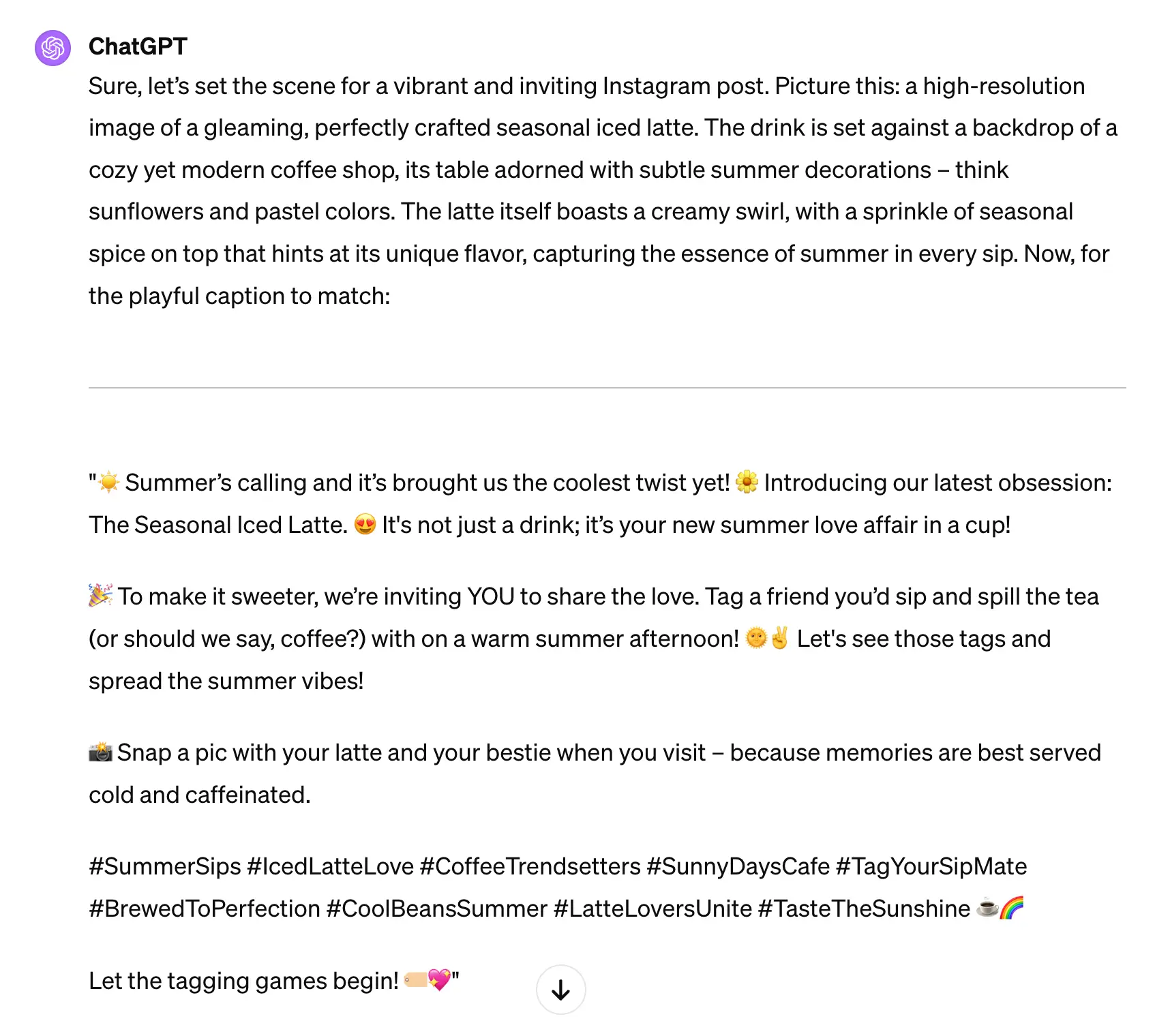
Besides creating posts for the various platforms, you can use AI to:
- Improve your social media bios
- Get hashtag ideas for your posts
- Analyze the demographics of your audience
- Respond to comments (after editing the responses)
- Find influencers in your niche
- Create a draft content calendar
- Get ideas for social media strategies
4. AI For PPC Marketing
PPC platforms like Google Ads have AI features built in, allowing advertisers to optimize their bidding strategies, keyword selection, ad headlines, and more. Facebook Ads has similar features and some nice tools that help create images and backgrounds of different sizes for your ads.
The best way to learn how to utilize each platform’s AI capabilities is to take their free courses. For example, Google offers free courses on using AI-powered Ads. Completing a course takes only a few hours, and you can use your knowledge to improve your campaigns.
In addition to the advertising platforms, you can use generative AI tools to perform keyword research, get recommendations for ad copy, and get ideas for landing page copy.
Here is a prompt for PPC keyword research: “Suggest high-intent keywords for a PPC campaign focused on selling handmade pottery online. The target market is U.S. customers interested in home decor. Include broad and niche keywords to balance reach and targeted traffic. Consider competitors in the handmade crafts market.”
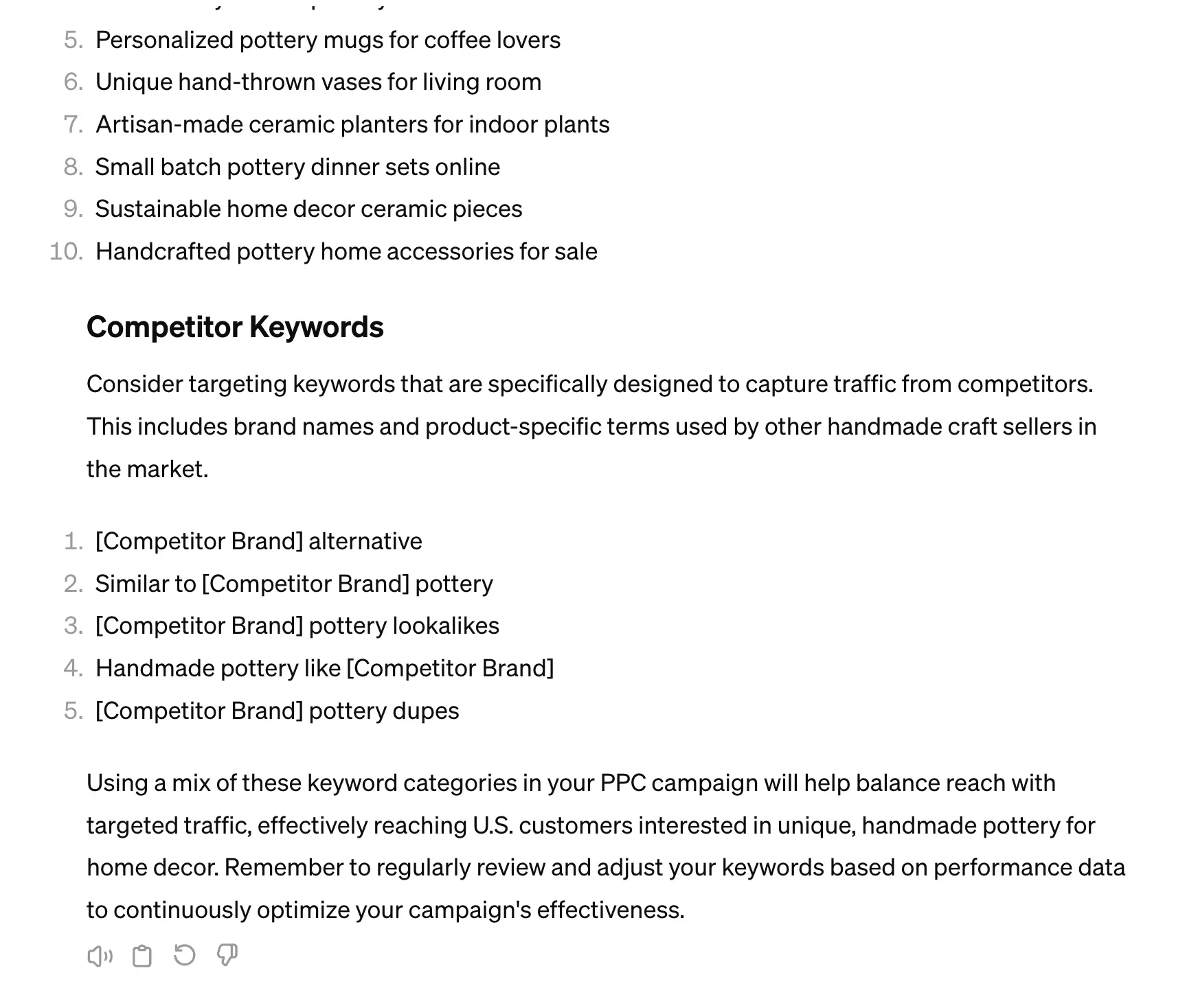
5. AI For Email Marketing
If you have noticed, almost all promotional videos of generative AI tools relate to email writing. These tools can use LLM (large language models) to understand human text and generate highly personalized content that resonates with each recipient.
So, one of the uses of AI for email marketing is related to crafting various types of emails. In your prompts, ensure you include the following details:
- Target Audience: Who will receive the email (include demographic and behavioral characteristics)
- Email Purpose: What is the main purpose of the email (generated leads, sales, information, etc.)?
- Key Messages: What are the main points of the email? What your audience should know about.
- Tone and Style: Define the desired tone (e.g., professional, casual, informative) to ensure consistency with your brand voice.
- Call to Action (CTA): What should users do after reading your email?
Other ways AI can assist email marketers are:
- Generate multiple email subject lines for A/B testing.
- Analyze open and engagement rates to find optimal sending times.
- Analyze user purchase behavior and create personalized emails for cross-selling and upselling.
6. AI For Ecommerce Marketing
To successfully carry out most Ecommerce SEO tasks, you need content in different forms (product titles, meta descriptions, product information, product guides, blog posts, etc). If you have many products in your store, it’s a lot of work. AI can help you speed up the content creation process without sacrificing quality.
For example, you can ask AI to :
- Optimize your product’s titles and descriptions.
- Create meaningful summaries of manufacturers’ product guides.
- Create FAQ sections for product pages.
- Write ALT text for images.
- Write video scripts for product demonstration videos.
- Create outlines for blog posts.
- Write email templates for email automation campaigns.
- Write code to help you export and analyze your customer data.
From experience, we found that AI can be more useful in Ecommerce marketing than other digital marketing channels.
7. AI For Video Marketing
AI tools can also produce video and sound from a single prompt. This feature is not yet available to the general public, but it will soon be. Once it does, it will change video marketing forever.
Currently, the biggest issue with video marketing is creating videos, which is time-consuming and costly. The whole industry will change if AI can give creators a faster way to produce videos.
For the time being, though, AI can assist video marketers by:
- Creating ideas for video scripts.
- Crafting video scripts.
- Generating titles and descriptions for videos.
- Summarizing video content.
- Analyzing video performance and recommending which content resonates best with an audience.
Cons of Using AI In Digital Marketing
Using AI in digital marketing does come with some disadvantages. Over time, the technology will improve, and no one knows the boundaries, but currently, you should be aware of the following:
Inaccurate Responses: An AI is trained to provide an answer to anything you ask it, even if it’s wrong or fictitious. Various examples circulate on the Internet of AI that are very confident in their responses, but in reality, they are full of inaccuracies and false claims.
As a marketer, you should never take an AI response for granted but always double-check the facts to ensure they are accurate.
Garbage In – Garbage Out: To get the most out of generative AI tools (like ChatGPT), you must learn how to write good prompts; otherwise, you won’t get the best responses back.
You must learn prompt engineering and experiment with different prompts and AI systems. In practice, this will take more time and cost your business.
Data Quality: AI algorithms require vast amounts of data to learn and make decisions. If the data is biased or incomplete, the AI’s decisions will be too. As marketers, we have no control over how AI models are trained, so we must review everything manually before launching a campaign.
Lack of Human Touch And Experience: Whether it’s writing content, expressing an opinion, or creating a digital marketing plan, AI lacks human experience. Experience, expertise, and emotions are human factors that play a crucial role in marketing, and machines can’t easily replicate them.
AI Digital Marketing Training
To learn more about how to use AI in digital marketing, consider the following training courses:
